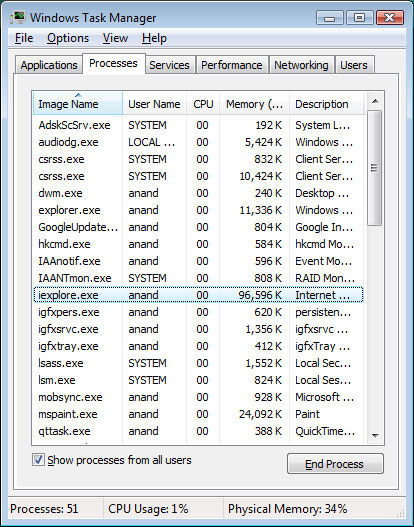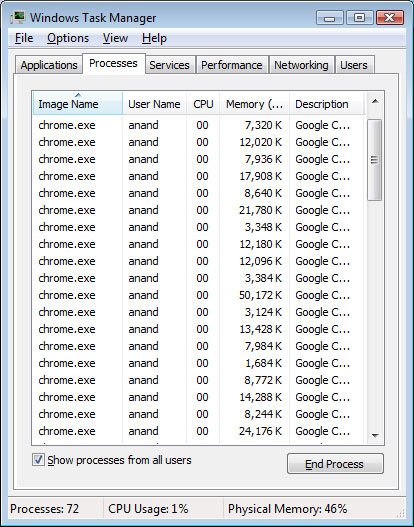Google Chrome: Performance and First Impressions
by Anand Lal Shimpi on September 3, 2008 12:00 AM EST- Posted in
- Software
More Efficient Memory Management
Fire up an IE7 window with 10 tabs in it and you’ll see this in your Task Manager:

A single iexplore.exe process that spawns a number of threads. The same goes for Firefox and Safari. The problem here is that if a single tab causes the process to crash, all of your open websites go with it. Chrome treats each tab as an individual process, which adds a little more overhead but the benefit is a single website won’t cause all of your other browser tabs/windows to crash.

You shouldn't lose all Chrome windows/tabs due to one misbehaving website/app
A single webpage stalling also won’t cause the rest of the tabs to stall, while the tabs in a Chrome window look physically connected, they are as independent as they get.
Chrome, as a result, will take up quite a bit of space in Task Manager:

Making each tab its own process means that you get memory back from closed tabs much quicker and much more efficiently than with other browsers. Consider this test: 1) Visit www.anandtech.com, 2) open tabs for digg.com, docs.google.com (and login) and www.facebook.com (and login), 3) Close the latter three websites.
I performed that exist test, in that order, and measured memory size after each step. The results are below:
| Websites | Google Chrome 0.2.149.27 | Internet Explorer 7.0.6001.18000 | Firefox 3.0.1 | Safari 3.1.2 |
| Just AnandTech.com | 26MB | 30MB | 30MB | 48MB |
| AT + Digg + Google Docs + Facebook | 105MB | 97MB | 87MB | 104MB |
| AT (After closing 3 tabs) | 38MB | 78MB | 70MB | 107MB |
Just viewing AnandTech alone, Chrome ended up being the most efficient browser with a 26MB footprint compared to 30MB for Firefox 3.0.1, 30.1MB for IE7 and a whopping 48MB for Safari 3.1.2.
Adding the other three sites brings the totals up to 104MB for Chrome, 104MB for Safari, 96MB for IE7 and 87MB for FF.
It’s closing the tabs that’s the most interesting: only Chrome actually frees up memory upon closing tabs. Chrome’s footprint is still larger than its original 26MB at 38MB, but the remaining three browsers continue using at least 70MB. The argument here is that these other browsers already have memory allocated should you open additional tabs, unfortunately you can quickly run into memory fragmentation issues with the conventional approach should the new tabs require more memory than the ones you just closed.
With Chrome, each tab is its own process, when you’re done with a tab - close it and you get all your memory back right away. You get more efficient usage of memory for newly created tabs.
The independent tabs are also physically independent within the UI, you can drag any tab out of a window and into another one or make it a new window by itself.
Chrome’s multi-process approach is also theoretically better for multi-core systems since you don’t have to worry about exploiting parallelism within a process, you’ve got process-level parallelism giving you more than enough threads to distribute across many cores. Thankfully web browsing isn’t the most CPU intensive and this process-level parallelism doesn’t amount to a huge performance benefit.










105 Comments
View All Comments
nerdynick - Wednesday, September 3, 2008 - link
Most innovative new browser features debut in Opera first, ie tabs,speed dial, mouse gestures, etc.
For that reason alone Opera should have been included.
aeternitas - Wednesday, September 3, 2008 - link
Very poor not to have included Opera.crimson117 - Wednesday, September 3, 2008 - link
Had you opened IE7 already since your last reboot? I opened IE7 for the first time after a reboot, and it took ~3 seconds (Wolfdale 3.0GHz, 4GB ram, Vista). Then I closed IE7, waited a minute, and opened IE7 again and it was nearly instant (<1.0s)
Donkey2008 - Wednesday, September 3, 2008 - link
I've been coming to Anandtech for years now and I always expect a decent technical rundown of software like this. Just because a home has a nice garden and new paint doesn't mean that all is right with the plumbing.Why didn't you guys notice that the browser is set to accept ALL cookies by default? Combine that with the DNS Pre-fetching (also on by default) and you have a dangerous combo. One wrong click and you'll have dozens of cookies installed on your machine from sites that you have never even visited (and how many will be a Google ad affiliate by chance?)
Sorry, but Google is possibly the WORST company on the entire internet to trust when it comes to privacy and this browser wasn't released out of the sheer goodness of their own heart with no strings attached.
My 2 cents.
By the way, the Chrome interface is quite nice. I like the simplicity :-)
crimson117 - Wednesday, September 3, 2008 - link
1. Google Chrome does not behave well with Vista set to use large fonts.2. Chrome plus large vista fonts = this text box (the one I'm typing this comment into) is behaving oddly.
3. Here are some opera memory numbers:
Just anandtech: 31.4MB
All 4: 92MB
Closed 3: 89.9MB
xoxor - Wednesday, September 3, 2008 - link
While Firefox & IE run DHTML Lemmings fine - Chrome does not actually play the game. I've also run into the NVIDIA site glitch as well as a few other sites.The TOS also bother me. Additionally, until I understand more about what it is doing with cache (specifically "Safe Browsing" under \Local Settings\Application Data\Google\Chrome\User Data) I'm not comfortable using it.
roguerower - Wednesday, September 3, 2008 - link
I'm probably just reiterating what everyone else has already said but I'm very disappointed that AT didn't test this new "Wonder Browser" vs. Opera. I switched from IE7 to Opera as a test run and within 10 minutes scrapped IE forever.Some interesting concepts...but some things look like they just took them from the O.
Matt Campbell - Wednesday, September 3, 2008 - link
So far my impressions are pretty good, but as Google stated their motto is "launch early and iterate", and I think they have a lot of iterations to go before Chrome will start wooing users away from the existing browsers. I agree with Ryan that the privacy statements in the terms of service worry me. I miss my mouse gestures from FF, my company webmail service still doesn't render properly in anything but IE, and Chrome tabs crashed on me several times on flash-heavy websites (though I could indeed kill that single tab without affecting the rest of the brower). It'll stay on my PC, but it will take a lot of changes to dethrone FF.jensend - Wednesday, September 3, 2008 - link
The impression people get when looking at that memory test is that everything other than Chrome is leaking gobs and gobs of memory, and that having and killing individual processes is the only smart way to avoid this. However, that's simply not the case- that memory is heap space that these browsers have available to use again. After closing those other windows out, try opening a bunch of websites again- Chrome's memory use will likely be higher than the rest, because it still pays the per-process penalties but the other browsers get to reuse that heap space.nubie - Wednesday, September 3, 2008 - link
I figure it this way: Google Browser gets better and saturates market: Google minimal OS pops up on ARM internet appliances with full Flash and Java support: people can spend $100 for a full-featured internet experience: Microsoft and Intel Sales dry up?Think it is a bit far-fetched? Perhaps; but consider the way Intel is trying to enter the handheld markets (some might say without being completely honest about performance and energy consumption in the process), and look at Microsoft trying to make their browser mandatory on Windows, and therefore largely synonymous with the "the internet" in the mind of the general public (and pretty much succeeding, you need to be pretty savvy to get windows to install without IE, and even more savvy to get it to install without vestiges of the engine, which is unfortunately used in the basic file management of the OS)